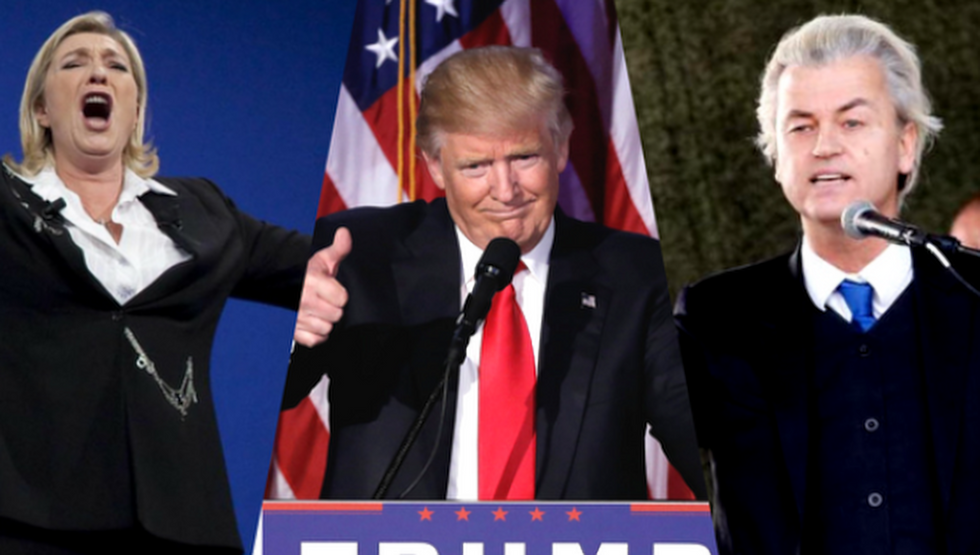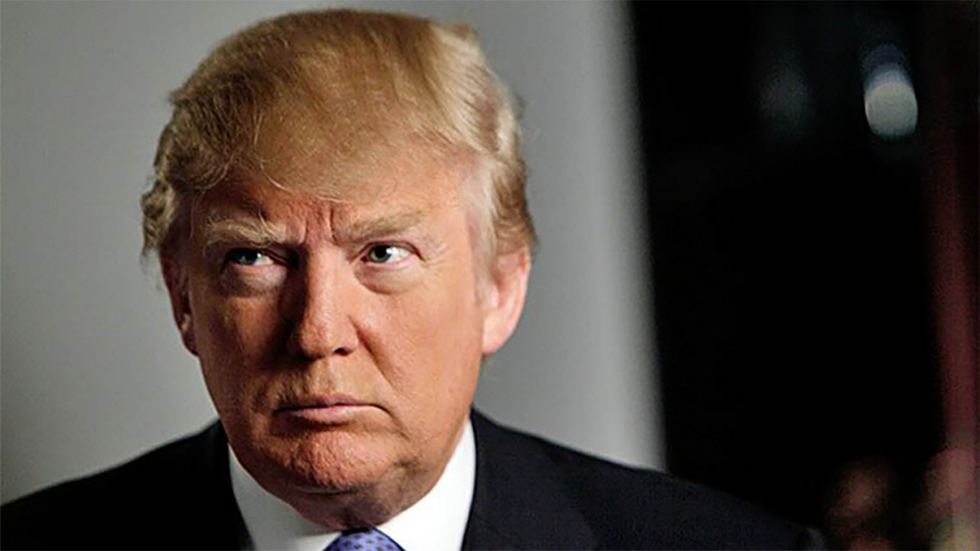As conflicting cultures shift fundamentals of society gradually throughout the European frontier, the political landscape continues to dramatically change. Europe, known for its progressive ideologies, is now being infiltrated with right-wing and nationalist ideas. The paranoia in European nations such as Britain, France and the Netherlands center around the fact that immigrants are holding a superior stance.
Although the right wing movement is on the rise in Europe, how long will it last?
I’ve been asking myself this question ever since Marine Le Pen pulled through the 2012 French elections with 17.9 percent of the popular vote in the first round. The National Front in France has been trying to tug France farther and farther right, despite having a progressive President.
Le Pen running again to hold office in 2017 seemed like a fairly terrifying thought to some French citizens, but with Le Pen’s promise to give France back to the “French people”, French citizens are biting at the bait the same way Donald Trump set up his campaign regarding national pride. Initially, I thought that Le Pen would pull off a victory in the race to become President, considering the high tensions and coming out on top when the first week of the opinion polls results was revealed.
Geert Wilders, heavily criticized for his anti-immigration policy, did worse than expected against Prime Minister Rutte. Wilders has promised his supporters that he would pull through this election, winning as the underdog. Wilders also compared a Freedom Party victory as Netherland’s Brexit, which is exactly what Le Pen is promising for France.
Although Wilders is promising a lot of the same Trump values, he continues to shy away from his association with Trump because he was frightened it would damage his campaign. In numerous interviews, Wilders states that he does not want to be known as the Dutch Donald Trump. Even after fighting off Trump comparisons, he still loses the election because of common parallels.
Le Pen and Wilders have similar standing grounds when it comes to immigration; however, having a Le Pen victory could be much more far-fetched than imagined before the Wilder’s upset. French progressives were terrified of the 2017 election because they saw the right-wing movement emerging and racial tendencies erupting under the surfaces of ordinary citizens. The French progressives saw frustration in the racists’ eyes and saw what was happening on the other side of the Atlantic Ocean.
So, if Wilders and Le Pen are so similar with the subject of Nationalism, then what exactly separates them?
Merely nothing.
The scary realization for the Le Pen campaign is that Europe might not be as far right as she thought it was. Wilders proved that with only obtaining 20 seats compared to his front runner’s 33 seats obtained.
Yes, Wilders pushed the Freedom Party into a higher position in the world of politics in The Netherlands, but it didn’t win him the presidency at all. Immigration into Europe scares some, yet taking such an obscure measure to a problem that may not be first on some people’s bucket lists is why Europe is in fact not moving to the right wing as rapidly as once thought.
Europeans are scared of the consequences such actions, like shutting off an entire region, will cause them. President Trump’s travel ban has caused 53 percent of Americans to retaliate against the idea of banning immigration from six other nations due to radical ideologies.
Even though there has been a multitude of terrorist attacks on European grounds in Belgium, France and many other nations in the European Union, it would be highly unlikely that some attacks would cause an entire nation’s viewpoint to shift. This is exactly why a lot of anti-immigration candidates in Europe despise Trump because he destroyed the viewpoint of that objective in Europe. Trump is highly undesirable in European nations, making it easier for a progressive candidate to win despite terrorist threats.
Progressive values have been instilled in European minds ever since World War II due to the influence of the Soviet Union in Eastern European countries. Moving away from these ideas wouldn’t take one or two election years, it would take a century. The anti-immigration movement would have to shy away from the Trump image over the next few decades and rebrand themselves the same way Le Pen rebranded the National Front.
More political organizations for teenagers and young adults are aimed primarily towards nationalist ideas rather than progressive ideas considering a majority of older European voters grew up under a progressive and open-border mindset.
The majority of people who voted for Trump are older, working class, Americans while young voters were inclined to vote primarily for a candidate like Bernie Sanders or Hillary Clinton. In Europe, it’s the opposite, most of Wilders’ cult following was younger Dutch citizens.
The same goes for Le Pen, having 35 percent of the youth vote swaying towards her party while the Republican and Socialist parties only gathered 21 percent of the national youth vote. This percentage rose from the initial 26 percent of the youth vote Le Pen carried in 2012 against the Socialist candidate Hollande holding 25 percent of the youth vote.
Generation Z is commonly known as the “homelander” abroad due to being concerned about threats to their respective primary countries. While this homelander trend continues no matter what border you cross, the lines begin to blur and differentiate when you move away from immigration.
Just because both France and America could have the same concerns regarding immigration doesn’t mean that young people in France would have the same issues as young conservatives in America do. Le Pen and Trump can’t have the same exact turnout and win because besides immigration, values and concerns of the citizens in each nation vary.
Now clearly Le Pen’s following in younger voters is increasing per election but will it be enough? With most adults above the age of thirty leaning more towards the left, a little spark in the youth vote means nothing right now. That youth vote will one day be the majority vote when decades pass and their grandparents and parents aren’t able to vote anymore. The immense issue concerning some French citizens isn’t solely just dealing with immigration but also deals directly with the French economy and how it could prosper like it used to.
Since she placed third in 2012, a poll conducted by BVA showed that although 48 percent of her voters swayed towards the Republican nominee, Nicolas Sarkozy; there was still 24 percent of her voters that said they would vote for Hollande. In addition to this, if people are concerned about this being a replica of the Trump victory, we must consider that Trump didn’t win the popular vote. In French elections, the election is solely based off of the French citizens’ voting pattern.
So, if the American election occurred in France, Hillary Clinton would most certainly win. Yes, of course, there are closet Le Pen supporters the same way there are closet Trump supporters, but France never had a National Front leader before.
Psychologically speaking, change terrifies certain people; having Le Pen control a country with interesting foreign relation issues is a bold move. President Trump takes influences from both the right and the left, meanwhile, the National Front is a face France has seen since the late 70s but has always pushed away from.
Le Pen has given the National Front a facelift from her father’s radical fascist policies. Her father, Jean-Marie Le Pen, received massive criticism for the way he established the National Front party and its viewpoints. Many paint him as a racist and as a Nazi figure due to his words. This will all be hard for Le Pen to recraft and remodel especially after decades of her father being the centerpiece of the political party.
The current French election will display a reverse Trump model. It won’t be about the underdog like the United States 2016 election, but more about having the party older audiences have increased favorability for come out on top. 53 percent of Americans the ages 45-64 ended up voting for the Republican party. In France, it’s almost the same statistics but reversed.
Wilders’ association with Trump might have been what cost him a few seats in his election race because of Trump’s overly negative reception overseas. Even if Le Pen tries to run from these “French Donald Trump” trademarks, it won’t stop the average voter from thinking she replicates his style of campaigning. Both Le Pen and Trump have had controversial campaigns with major backlash and because of these similarities, there’s no shot she could pull off a monstrous win or even a win at all.
The Fillon and Le Pen election race may seem close in opinion polls, but when it comes to actually voting, the tables may turn. Clinton saw the light when she had the positive side of almost every poll in the country, yet she ended up losing the election.
If we learned anything from the US election it’s not trust the polls; however, if we learned anything from the Dutch election it’s that the negative influence Trump had abroad is evident. A Wilders’ upset is the first wave against the Brexit and Trump trend, Le Pen could be the next.





 Photo by
Photo by  person holding black smartphone on white textile
Photo by
person holding black smartphone on white textile
Photo by  StableDiffusion
StableDiffusion
 Photo by
Photo by  Photo by
Photo by 
 roommate as a therapist
StableDiffusion
roommate as a therapist
StableDiffusion
 woman in white shirt eating pizza
Photo by
woman in white shirt eating pizza
Photo by  person holding remote pointing at TV
Photo by
person holding remote pointing at TV
Photo by  person holding assorted clothes in wooden hanger
Photo by
person holding assorted clothes in wooden hanger
Photo by  a couple of
a couple of  friends cleaning apartment
StableDiffusion
friends cleaning apartment
StableDiffusion
 man driving car during golden hour
Photo by
man driving car during golden hour
Photo by  bacon strips and melted cheese topped fries on oval white and blue platter with gray stainless steel forks
Photo by
bacon strips and melted cheese topped fries on oval white and blue platter with gray stainless steel forks
Photo by  selective focus photography of eyeshadow palette
Photo by
selective focus photography of eyeshadow palette
Photo by  brown wooden framed white padded chair in between green indoor leaf plants inside bedroom
Photo by
brown wooden framed white padded chair in between green indoor leaf plants inside bedroom
Photo by  women forming
women forming  taking
taking  man in red polo shirt pouring wine on clear wine glass
Photo by
man in red polo shirt pouring wine on clear wine glass
Photo by  woman in black jacket standing on road during daytime
Photo by
woman in black jacket standing on road during daytime
Photo by 
 StableDiffusion
StableDiffusion
 StableDiffusion
StableDiffusion
 student thinking i shouldnt have procrastinated all semester
StableDiffusion
student thinking i shouldnt have procrastinated all semester
StableDiffusion
 Photo by
Photo by  Photo by
Photo by  Photo by
Photo by  StableDiffusion
StableDiffusion
 StableDiffusion
StableDiffusion
 Photo by
Photo by  Photo by
Photo by 


 Lumiere figure at the Disney Store at the Ala Moana Shoppi… | Flickr
Lumiere figure at the Disney Store at the Ala Moana Shoppi… | Flickr
















